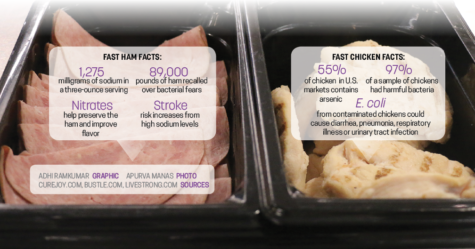January means New Year’s and New Year’s resolutions, where the cliché resolution of eating healthier seems to be common. In our school, our cafeteria offers us a wide variety of lunch choices— some may be more healthy or more delicious than others, but all in all, there is a complete list of options where anyone can surely find something to eat on any given day. However, it’s worth noting that the menu also includes many processed meats, a food whose health impacts may not be widely considered by students.
Processed meats include sliced turkey, bologna deli meats, bacon, ham and hot dogs. They are defined by meats that have been smoked, salted, cured or have a preservative added. As a part of the World Health Organization (WHO), the International Agency for Research on Cancer (IARC) classifies substances in relation to their cancer-causing pathogenicity as the following: Group 1 means the substance is carcinogenic to humans, Group 2A means the substance is probably carcinogenic to humans, and so on.
In 2015, the IARC declared processed meats as a Group 1 carcinogen and red meats to be a Group 2 carcinogen. Group 1 includes tobacco and asbestos, but this does not mean that processed meats are as likely to cause cancer as tobacco and asbestos—only that processed meats along with tobacco and asbestos are “known to be human carcinogens.”
Leading studies, including a study by the Imperial College London led by researcher Doris Chan, find that “intake of red and processed meat is associated with significant increased risk of colorectal, colon and rectal cancers.” In fact, almost all studies unanimously link consumption of processed meats with namely, colorectal or bowel cancer.
Because of these health risks, CHS should consider limiting serving deli meats and sausages. More importantly, in their day-to-day lives, students should also consider eating less red and processed meats. Obviously, indulge as need be, but in light of our resolutions, we should all take steps to better our health.
The views in this column do not necessarily reflect the views of the HiLite staff. Reach Anushka Dasgupta at [email protected].





























![Keep the New Gloves: Fighter Safety Is Non-Negotiable [opinion]](https://hilite.org/wp-content/uploads/2024/12/ufcglovescolumncover-1200x471.png)















































![Review: “Family By Choice” is the perfect watch that encapsulates family, love and everything in between [MUSE]](https://hilite.org/wp-content/uploads/2024/12/family-by-choice-1.png)
![Review: “A Phở Love Story” is an exceptional and authentic representation of teenage Vietnamese-Americans [MUSE]](https://hilite.org/wp-content/uploads/2024/12/a-pho-love-story-9781534441941_hr-786x1200.jpg)
![Review: “And the War Came” by Shakey Graves is the perfect year-round album [MUSE]](https://hilite.org/wp-content/uploads/2024/12/IMG_2665.jpeg)
![Review: "Abbott Elementary", a show I can watch with my family and truly enjoy [MUSE]](https://hilite.org/wp-content/uploads/2024/12/unnamed-1.png)
![Review: “We Live in Time” leaves you wanting more [MUSE]](https://hilite.org/wp-content/uploads/2024/12/IMG_6358.jpg)
![Review in Print: Maripaz Villar brings a delightfully unique style to the world of WEBTOON [MUSE]](https://hilite.org/wp-content/uploads/2023/12/maripazcover-1200x960.jpg)
![Review: “The Sword of Kaigen” is a masterpiece [MUSE]](https://hilite.org/wp-content/uploads/2023/11/Screenshot-2023-11-26-201051.png)
![Review: Gateron Oil Kings, great linear switches, okay price [MUSE]](https://hilite.org/wp-content/uploads/2023/11/Screenshot-2023-11-26-200553.png)
![Review: “A Haunting in Venice” is a significant improvement from other Agatha Christie adaptations [MUSE]](https://hilite.org/wp-content/uploads/2023/11/e7ee2938a6d422669771bce6d8088521.jpg)
![Review: A Thanksgiving story from elementary school, still just as interesting [MUSE]](https://hilite.org/wp-content/uploads/2023/11/Screenshot-2023-11-26-195514-987x1200.png)
![Review: "When I Fly Towards You", cute, uplifting youth drama [MUSE]](https://hilite.org/wp-content/uploads/2023/09/When-I-Fly-Towards-You-Chinese-drama.png)
![Postcards from Muse: Hawaii Travel Diary [MUSE]](https://hilite.org/wp-content/uploads/2023/09/My-project-1-1200x1200.jpg)
![Review: "Ladybug & Cat Noir: The Movie," departure from original show [MUSE]](https://hilite.org/wp-content/uploads/2023/09/Ladybug__Cat_Noir_-_The_Movie_poster.jpg)
![Review in Print: "Hidden Love" is the cute, uplifting drama everyone needs [MUSE]](https://hilite.org/wp-content/uploads/2023/09/hiddenlovecover-e1693597208225-1030x1200.png)
![Review in Print: "Heartstopper" is the heartwarming queer romance we all need [MUSE]](https://hilite.org/wp-content/uploads/2023/08/museheartstoppercover-1200x654.png)



